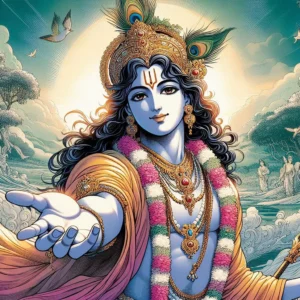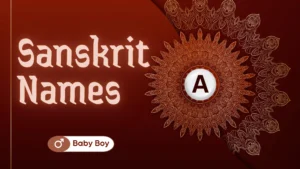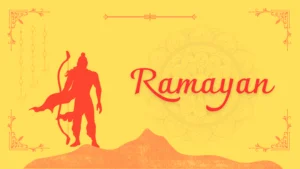“What’s in a name?” In Hinduism, everything. A name isn’t just a label; it’s a manifestation of energy, intention, and purpose. From the moment a child is named during the sacred Namkaran ceremony, their life’s path begins to align with the vibrations their name carries. Hindu thought places immense significance on names, believing they can influence destiny, character, and even karma.
Our ancient scriptures—the Vedas, Puranas, and Upanishads—stress the power of sound and syllables. The belief is that every name resonates with cosmic energy, weaving a connection between the individual and the divine. Whether it’s invoking Krishna for compassion or Shiva for transformation, parents strive to gift their children a name that mirrors virtues, hopes, and aspirations. Across generations, Hindu families have honoured this practice, not just as tradition, but as a spiritual responsibility—one that ensures a name becomes the first guiding light on the child’s journey through life.
The meaning of life is found in the meaning of your name.

1. Names as Carriers of Vibration and Energy
The ancients believed that every syllable, every sound, carries within it a distinct vibration, resonating with cosmic energies that shape the individual’s destiny. In Hinduism, names are not merely labels—they are power tools, aligning the bearer with spiritual frequencies. Much like the carefully crafted mantras chanted during rituals, the utterance of a name invokes subtle energies that influence personality and life path.
Consider Bija Mantras, the single-syllable sounds like “Om”, “Hrīṃ”, and “Śrīṃ”. These aren’t random utterances but conduits for connecting with the divine. “Om,” the primordial sound of the universe, vibrates at a frequency believed to cleanse the mind and body. It’s no wonder that parents choose names like Ram or Shiv, believing every time the name is spoken, it draws in positive energy. Growing up, I heard elders say that the simple act of chanting “Ram” when facing difficulties could dispel fear and attract auspicious outcomes. Perhaps, in this light, a name isn’t just an identifier—it becomes a lifelong invocation of divine energy.

2. The Role of Astrology and Nakshatras in Naming
In Hindu tradition, the stars govern not just the fate of a newborn but also their name itself. According to astrology, the exact time of birth reveals a child’s Nakshatra (birth star), which, in turn, determines the ideal syllables for their name. The process isn’t arbitrary—it is a deep-seated belief that aligning a name with the cosmic configuration at the moment of birth will harmonize the child’s destiny with universal energies.
For instance, a baby born under Ashwini Nakshatra is often named with syllables like ‘Chu,’ ‘Che,’ or ‘Cho.’ Each syllable carries an affinity to the planetary energies governing the Nakshatra. Similarly, a child born with Krittika Nakshatra might have names starting with ‘A’ or ‘I.’ The underlying principle is that by choosing a name aligned with these stars, parents can bestow upon their child a life of balance and well-being. Rashi (zodiac sign) also plays a significant role, as each sign is linked to a set of letters considered favourable and auspicious. Astrology offers a fascinating intersection between cosmic alignment and human identity, creating a sense of purpose with every name bestowed.

3. The Impact of Numerology on Names and Destiny
Hindu belief extends beyond the stars—numerology has its own significance in shaping destiny. Numbers, much like sounds, are believed to carry vibrations that influence one’s life. In name numerology, each letter corresponds to a specific number, which, when combined, produces a sum that reflects the child’s core personality and life path. For example, if a child’s birth number is 6, numerologists might recommend names whose numerical sum aligns with the positive attributes of this number, such as harmony and nurturing qualities.
It’s not uncommon to find parents consulting numerologists to tweak their child’s name—adding or removing letters to ensure compatibility with auspicious numbers. A minor shift, like adding an extra ‘a’ or ‘h,’ is often seen as a way to enhance fortune and protect the child from misfortune. A friend once told me how her parents altered her original name by adding a vowel, resulting in a significant improvement in her academic performance—a subtle yet profound example of numerology’s influence on destiny.

4. Naming Rituals and Their Significance in Shaping Identity
In Hindu culture, the act of naming a child is much more than a joyous family event—it is a sacred ritual. The Namkaran ceremony, often conducted on the 11th or 12th day after birth, serves to align the child with divine blessings and cosmic order. During the ritual, the family priest carefully selects a name based on the child’s Nakshatra or Rashi, ensuring that the vibrations of the chosen syllables resonate with the child’s astrological blueprint.
This ritual isn’t just a tradition but a powerful act of identity formation. By giving a name, the parents metaphorically chart the child’s life course, embedding within it spiritual aspirations and familial values. In certain communities, a child’s name is believed to hold the power to enhance personal growth, prosperity, and spiritual development throughout life. A well-chosen name, blessed in the presence of deities and ancestors, becomes more than a mere title—it transforms into a guiding force that accompanies the individual through the ups and downs of life’s journey.

5. Names as a Reflection of Divine Qualities and Aspirations
In Hindu tradition, a name is far more than just a convenient tag to distinguish one child from another. It is, in many ways, a prayer in disguise—a subtle but powerful invocation of qualities that parents hope their child will embody throughout life. Names drawn from Hindu deities and virtues are carefully chosen with the belief that they can channel the energy and essence of the divine into the child’s journey.
Consider names like Vikram, a title attributed to Lord Vishnu, which exemplifies courage, valour, and endurance. It is a name that urges its bearer to rise in the face of challenges, reminding them to tread with strength and resilience. Similarly, Madhav, another name for Vishnu, evokes the qualities of compassion and stability, attributes every parent hopes their child will cultivate.
Likewise, names inspired by Goddess Saraswati, such as Sharvani or Vidya, reflect the quest for knowledge and wisdom. These names whisper of a path paved with learning, a life anchored in creativity, and the grace of understanding. A child’s name, in this sense, becomes a compass for their character, gently steering them toward virtues their parents wish to nurture. Each time the name is spoken, it reaffirms the aspirations tied to that soul—an affirmation that guides not only the child but the parents themselves.

6. Name Changes and Destiny: Can Changing a Name Alter Fate?
It is a fascinating belief that names, like the individuals they define, carry karmic weight. In Hinduism, it is not uncommon to come across stories of individuals changing their names later in life, hoping to reset the course of their destiny or overcome misfortune. After all, the syllables of a name are said to vibrate in alignment with cosmic energy, and even a small shift—a new letter or a slight tweak—can alter the trajectory of one’s journey.
Consider the world of celebrities and public figures who have embraced new names for success. Think of Bollywood actors or politicians who consult astrologers to add an extra vowel or consonant, seeking to reconcile their name with a more favourable Rashi or birth number. These seemingly minor adjustments often reflect a deeper desire to rewrite one’s script, to align fate with ambition.
Name numerology is a thriving practice among modern parents and individuals alike. It is not merely superstition but a calculated decision rooted in the belief that the right combination of letters can remove obstacles, usher in luck, and open new opportunities. The question remains—does a new name alter fate, or does it empower the individual to believe in the change they seek? Perhaps, it is a bit of both.

7. Stories and Examples from Hindu Epics and Scriptures
Our ancient epics brim with examples of the transformative power of names. Take Lord Krishna, who was given multiple names at birth—Govinda, Madhusudan, Keshava, and more—each one encapsulating a unique facet of his divine role. From the playful cowherd of Vrindavan to the wise charioteer of Kurukshetra, Krishna’s names evolved with him, mapping his destiny at every step.
Similarly, Arjuna in the Mahabharata is known by several names—Parth, Dhananjaya, Savyasachi—each reflecting his deeds, talents, or lineage at different phases of his life. His names are not just identifiers but milestones of his growth, each one marking a moment of transformation on his path to becoming a hero.
The concept of name-based transformation reached its zenith with Prince Siddhartha, who became known as Buddha upon attaining enlightenment. His journey from a sheltered prince to an awakened soul stands as a testament to how a name can signify not just who you are, but who you are becoming.
Final Thoughts
In Hindu culture, naming a child is not merely a family tradition; it is a sacred responsibility. A name serves as a guiding force, gently nudging a person toward their highest potential, mirroring the interplay of karma and dharma in their life. When parents select a name, they do so with great intention—choosing not just a beautiful sound, but a lifelong message and mission encoded within it.
In this light, a well-chosen name becomes the first gift parents bestow upon their child—a gift that offers purpose, protection, and direction. Whether drawn from the gods, the stars, or ancient wisdom, a name is the child’s first connection to destiny. It is a prayer that unfolds over time, shaping character, nurturing growth, and setting the rhythm for a meaningful life.
Perhaps that is the ultimate essence of Hindu belief—names are not just words; they are promises. Promises of who we are and who we can become, are etched into the fabric of our very being, waiting to be fulfilled.
As the old saying goes, “The name you carry shapes the path you walk.” And in that journey, may each step taken be one of meaning, fulfilment, and alignment with life’s higher purpose.






Pingback: Understanding the Rituals of Namkaran (Naming Ceremony) - Naamkosh
Pingback: How Do You Choose a Name for Your Child? - Naamkosh
Pingback: Ultimate List of India’s Greatest Saints and Sages for Your Child - Naamkosh